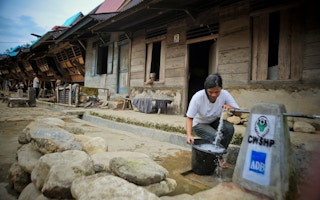The global discourse on development and all its goals has become almost entirely divorced from the local on-the-ground processes that deliver, or can deliver, these goals.
A recent blog by Sheela Patel notes how global funds are largely unaccountable to the people whose unmet needs they were set up to help address.
Despite claims by international agencies to support participation, accountability and (less often) community development, in reality the billion or so people who live in informal settlements have little say and almost no influence on the work done by these agencies – whether global funds or aid agencies, development banks or international NGOs.
This not only negates their claims of support, it also means their initiatives miss out on the dynamism and capabilities of organisations and federations of slum/shack dwellers.
Part of the problem lies in who speaks for these slum/shack dwellers and in so doing influences how work is prioritised and funded.
Here, I want to explore how the way problems are perceived helps shut out the very processes that can develop – and have developed – solutions.
It’s obvious that how a problem is defined influences what are viewed as solutions. Informal settlements can be seen as the problem – swamping local government with needs and demands it cannot meet, illegally occupying land… Or they can be seen as housing most of the low-paid workforce the city economy relies on.
The problem here is not the informal settlements but the failure of (local and national) government to produce better alternatives for their low-income population.
Global goals discourse: A crowded space
The UN global discourse allows a wide range of groups or stakeholders to be represented. This has encouraged groups or coalitions to form, and press for more attention to their chosen agenda.
It’s very difficult to oppose louder demands for water or sanitation or child immunisation or protection against malaria. Enormous numbers of people and institutions choose to focus on one thing, where success is marked by how often their focus area is mentioned or how much funding it is allocated.
So in discussions at the United Nations on achieving the Sustainable Development Goals (SDGs) and now on the new urban agenda (to be agreed at Habitat III in October 2016), these groups self-organise to get recognition for ‘their agenda’ whether for gender equality, awareness of the needs of disabled people, of infants, children, youth or older age groups, of migrants, indigenous groups, local communities, refugees, internally displaced persons – or even (occasionally) the urban poor or slum dwellers.
These lists of those needing particular attention, since so many of the goals are relevant to them, are repeated endlessly.
Or discussions may hone in on particular hazards – indoor air pollution, ambient pollution, malaria, HIV/AIDS – where each group seeks statistics to justify their chosen focus (and often using exaggerated figures).
Added to this are groups lobbying for the special needs of groups of countries – small island states, landlocked states, least developed countries. Of course, what is recommended has to be sustainable (although with much confusion as to whether this is sustaining/keeping going some initiative or working within planetary boundaries). Now everything has to be resilient and inclusive too.
More mores, more lists
Meanwhile the documents to accommodate all these worthy UN agendas ̶ intended to guide action ̶ become stuffed with adjectives that are repeated again and again (inclusive, sustainable, sustained, safe, resilient, transformative…) and carry endless lists of ‘stakeholders’ or ‘partners’. The current 23-page draft of the new urban agenda uses the word ‘sustainable’ 124 times.
Since no well-organised group whose cause is judged legitimate can be ignored, lists expand.
Amid efforts to get greater recognition of the particular needs of urban areas, there are groups insisting that every time ‘city’ or ‘urban’ is referenced, so too must ‘human settlements’ or ‘rural settlements’ be mentioned. As if ‘rural development’ proponents include any commitment to urban development (of course most do not).
Local processes must be supported
But at least for most urban areas, the focus should be on the failure of urban governments to ensure provision for a long list of basic services ̶ ‘water, sanitation, waste collection, health care, schools…’.
And one key reason for this failure is the lack of external support for the local processes that can or do deliver on the long lists of goals.
Local and democratic participatory processes allow the long list of needs by a long list of groups to be addressed – but in response to local needs, local groups and local capabilities.
“
The problem here is not the informal settlements but the failure of (local and national) government to produce better alternatives for their low-income population.
Only by investing in local processes will we achieve the SDGs and the goals set out in the new urban agenda. And these processes must be accountable to their population, with measures to address the needs of all the different groups and while responding to local democratic pressures.
The various drafts of the new urban agenda fail to prioritise support for urban governments committed to democratic processes and for local civil society, especially those that have developed their own local processes of accountability and transparency.
Sheela’s blog highlights how global funds and international agencies are only as effective as the intermediaries they fund on the ground. It is time they recognised the need to engage with, work with and support the organisations and federations of the very groups whose needs legitimise their existence.
And from here to consider where and how local funds can channel support to local processes direct – and real partnerships between local government and slum/shack dweller organisations and federations that can deliver the local and global goals.
David Satterthwaite (david.satterthwaite@iied.org) is a senior fellow in IIED’s Human Settlements research group and visiting professor at the Development Planning Unit, University College, London.











